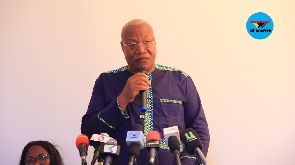The next government of the National Democratic Congress (NDC) will absorb apprenticeship fees paid by carpenters, welders, plumbers, electricians, and hairdressers, among others, the party's Election 2020 Campaign Manager has said.
Prof Joshua Alabi said the party's technical and vocational education and training (TVET) programme would also recognize experiential knowledge for progression to higher levels.
Explaining in detail the party's TVET programme, the Campaign manager said the NDC Presidential Candidate believes that providing financial support to an apprentice would contribute towards both job creation and the development of critical mass needed for national development.
"In countries like Germany and Singapore, it is skills development that moves the country but in our country, we've placed more emphasis on the grammar type of education," he bemoaned.
The NDC Campaign Manager said the time is ripe for the country to reconsider technical and vocation education and training (TVET) as a potent tool for development and that is what Mr Mahama is committed to.
Prof Alabi was reacting to the TVET programme outlined by Mr Mahama during his tour of the country.
The tradition in Ghana is that an apprentice learning any trade may have to pay an amount as a commitment fee to their masters.
This amount sometimes serves as a setback to some people who critically need to acquire the skills.
But Prof Alabi has assured Ghanaians "the next government of His Excellency President John Mahama will focus on job creation and we are going to look at vocational and technical training since a lot of the youth fall in the skills development category."
"The government of John Mahama would absorb the fees that they usually pay to their masters," he said.
He added, "the NDC government will deploy a prior learning recognition framework which would recognize knowledge gained through experience."
Professor Alabi further explained the national comprehensive qualifications framework would mark the knowledge gained through training and experience to various levels for progression from certificate level, through Diploma to a degree (B-Tech), masters (M-Tech) and Professional Doctorates (D-Tech).
He said the qualification framework would apply to those apprentices who want to progress to acquire higher qualifications.
"The certificate acquired would define what one can do and that would be used to place those who want to progress on the professional academic ladder. The certificate acquired can qualify one into either technical school or technical university. So one has the opportunity to continue to practice his skills in his own business while at the same time attend technical university if he or she so wished."
According to the NDC campaign manager, the Council for Technical and Vocational Education and Training (COTVET) has in place the qualification framework to recognise prior learning but this has not yet received full implementation.
But Prof Alabi said the "next NDC government under the able leadership of H.E John Mahama will give full meaning to these existing policies and framework to promote TVET in Ghana to drive Ghana's development agenda."
"If you want to be a dressmaker, the government will absorb the amount required and we would establish technical universities in the new regions as well as technical and vocational schools across the country," he said.
"First you are guaranteed your jobs then if you want to progress beyond that you can attend any of the technical universities because they are going to be free," he explained, adding the programme is designed to facilitate "technology transfer" at all levels.
The NDC Campaign Manager is emphatic the TVET programme of Mr Mahama is "going to be the main engine to drive the economy."
Politics of Wednesday, 2 September 2020
Source: theheraldghana.com

















